

The Third Culture - Contents. INTRODUCTION "The Emerging Third Culture" The third culture consists of those scientists and other thinkers in the empirical world who, through their work and expository writing, are taking the place of the traditional intellectual in rendering visible the deeper meanings of our lives, redefining who and what we are.
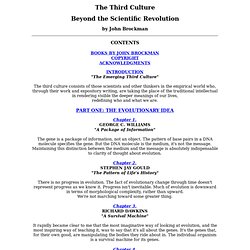
Chapter 1. GEORGE C. WILLIAMS "A Package of Information" The gene is a package of information, not an object. The pattern of base pairs in a DNA molecule specifies the gene. Chapter 2. Chapter 3. We have the beginnings of an answer as to why, in some places, one snail species is so variable, but we have no real idea why in any species anywhere at any time no two individuals are identical. Chapter 6. Species are real entities, spatiotemporally bounded, and they're information entities. Chapter 10. The idea of consciousness as a virtual machine is a nice intuition pump.
Chapter 11. Chapter 12. Chapter 13. Chapter 14. PART THREE: QUESTIONS OF ORIGINS Chapter 15. Chapter 16. Philosophy: Free Courses. Get free Philosophy courses from the world’s leading universities.
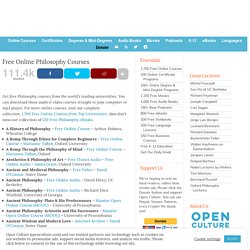
You can download these audio & video courses straight to your computer or mp3 player. For more online courses, visit our complete collection, 1,700 Free Online Courses from Top Universities. Size of Wikipedia. This Wikipedia:Statistics page measures the size of the English-language edition of Wikipedia; mostly page and article count.

There are currently 4,492,873 articles in the English Wikipedia. Most of the earlier entries were extracted from Wikipedia:Announcements. Post-postmodernism. Post-postmodernism is a wide-ranging set of developments in critical theory, philosophy, architecture, art, literature, and culture which are emerging from and reacting to postmodernism.
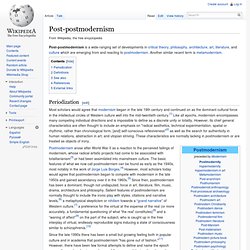
Another similar recent term is metamodernism. Periodization[edit] Most scholars would agree that modernism began in the late 19th century and continued on as the dominant cultural force in the intellectual circles of Western culture well into the mid-twentieth century.[1] Like all epochs, modernism encompasses many competing individual directions and is impossible to define as a discrete unity or totality. However, its chief general characteristics are often thought to include an emphasis on "radical aesthetics, technical experimentation, spatial or rhythmic, rather than chronological form, [and] self-conscious reflexiveness"[2] as well as the search for authenticity in human relations, abstraction in art, and utopian striving. Definitions[edit] See also[edit] References[edit] External links[edit] Metamodernism. In philosophy and aesthetics, metamodernism is a recent reaction to postmodernism informed by elements of both modernism and postmodernism.
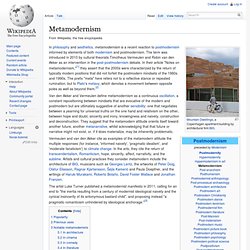
The term was introduced in 2010 by cultural theorists Timotheus Vermeulen and Robin van den Akker as an intervention in the post-postmodernism debate. In their article "Notes on metamodernism,"[1] they assert that the 2000s were characterized by the return of typically modern positions that did not forfeit the postmodern mindsets of the 1980s and 1990s. The prefix "meta" here refers not to a reflective stance or repeated rumination, but to Plato's metaxy, which denotes a movement between opposite poles as well as beyond them.[2] The artist Luke Turner published a metamodernist manifesto in 2011, calling for an end to "the inertia resulting from a century of modernist ideological naivety and the cynical insincerity of its antonymous bastard child", and proposing instead "a pragmatic romanticism unhindered by ideological anchorage.
Ludwig Wittgenstein. First published Fri Nov 8, 2002; substantive revision Mon Mar 3, 2014 Considered by some to be the greatest philosopher of the 20th century, Ludwig Wittgenstein played a central, if controversial, role in 20th-century analytic philosophy.
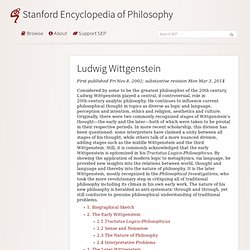
He continues to influence current philosophical thought in topics as diverse as logic and language, perception and intention, ethics and religion, aesthetics and culture. Originally, there were two commonly recognized stages of Wittgenstein's thought—the early and the later—both of which were taken to be pivotal in their respective periods. In more recent scholarship, this division has been questioned: some interpreters have claimed a unity between all stages of his thought, while others talk of a more nuanced division, adding stages such as the middle Wittgenstein and the third Wittgenstein. Still, it is commonly acknowledged that the early Wittgenstein is epitomized in his Tractatus Logico-Philosophicus. 1. 2.
The Unity of Science. Eliminative Materialism. First published Thu May 8, 2003; substantive revision Tue Apr 16, 2013 Eliminative materialism (or eliminativism) is the radical claim that our ordinary, common-sense understanding of the mind is deeply wrong and that some or all of the mental states posited by common-sense do not actually exist.
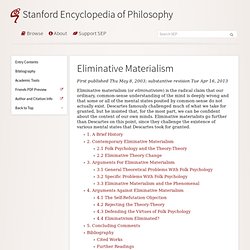
Descartes famously challenged much of what we take for granted, but he insisted that, for the most part, we can be confident about the content of our own minds. Eliminative materialists go further than Descartes on this point, since they challenge the existence of various mental states that Descartes took for granted. 1. A Brief History. Libertarian socialism. Overview[edit]
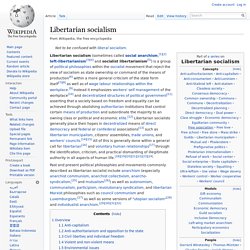
Morality and Evolutionary Biology. First published Fri Dec 19, 2008 A recent article in The Economist—sporting the provocative subtitle “Biology Invades a Field Philosophers Thought was Safely Theirs”—begins with the following rumination: Whence morality?
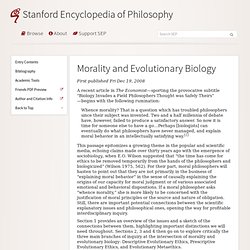
That is a question which has troubled philosophers since their subject was invented. Two and a half millennia of debate have, however, failed to produce a satisfactory answer. So now it is time for someone else to have a go…Perhaps [biologists] can eventually do what philosophers have never managed, and explain moral behavior in an intellectually satisfying way.[1] Evolutionary Ethics Evolutionary ethics tries to bridge the gap between philosophy and the natural sciences by arguing that natural selection has instilled human beings with a moral sense, a disposition to be good.
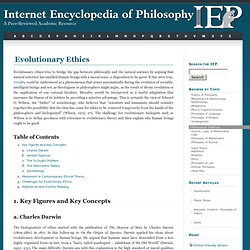
If this were true, morality could be understood as a phenomenon that arises automatically during the evolution of sociable, intelligent beings and not, as theologians or philosophers might argue, as the result of divine revelation or the application of our rational faculties. Morality would be interpreted as a useful adaptation that increases the fitness of its holders by providing a selective advantage. Process Philosophy. First published Mon Oct 15, 2012 Process philosophy is based on the premise that being is dynamic and that the dynamic nature of being should be the primary focus of any comprehensive philosophical account of reality and our place within it.
Even though we experience our world and ourselves as continuously changing, Western metaphysics has long been obsessed with describing reality as an assembly of static individuals whose dynamic features are either taken to be mere appearances or ontologically secondary and derivative. Mario Bunge. Mario Augusto Bunge (Spanish: [ˈbuŋxe]; born September 21, 1919) is an Argentine philosopher and physicist mainly active in Canada.
Biography[edit] Bunge began his studies at the National University of La Plata, graduating with a Ph.D. in physico-mathematical sciences in 1952. Wiki infographic.